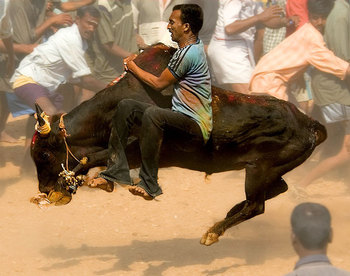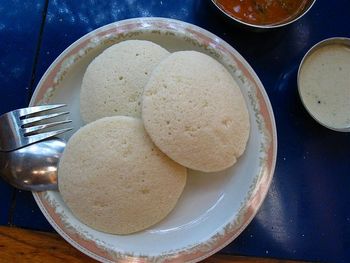Jallikattu
"Jallikattu" or "Manju Virattu" ("chasing the bull") is a bull taming competition organized in the Indian state Tamil Nadu located in the southernmost part of the country. Word Jalikatu comes from two terms - "Salli kassu" (coins) and "Kattu" (a package). Coins tied to the horns of the bulls represent the prize money that can be won at this competition.
Jallikattu is held on the eve of "Mattu Pongal". Mattu Pongal is the third of four days at the Pongal festival. According to the Western calendar it is organized on the 15th of January.
The largest Jallikattu is the one in Alanganallur near city of Madurai. Other places with famous Jallikattu competitions are Tiruvapur, Thammampatti and Palamedu.
Jallikattu is more than 2,000 years ago old. Good proof for it are cave paintings, showing men chasing bulls, that were found in Karikkiyur village located in the Nilgiris district. Long time ago Jalikattu used to be a way for local women to choose their husbands.
Magnificent Kangeyam bull (Kanganad, Kongu Nadu), belonging to the Zebu cattle breeds, is the one usually involved in this competition. The bull is decorated with "gulal" (colored powder), ribbons and garlands.
 Jallikattu
Jallikattu
During Jallikattu several people try empty handed to tame the running bull by controlling his horns. Sometimes more than one bull is released at the same time. The winner gets a watch, "lungi" or "sarong" (a traditional piece of clothes worn round the waist) etc.
It has to be said that The Supreme Court of India had banned Jallikattu. But it later withdrawn the ban under condition that organizers of the event take all the measures necessary to protect bulls and people.
 Idli
Idli
People at Jallikattu can buy lot of local delicacies like for example "idli" (a cake made of batter of fermented rice, black lentils and fenugreek) and "vada" (a doughnut-shaped delicacy made of lentil).